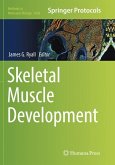The development and maintenance of muscle cells is controlled by complex regulatory networks involving epigenetic marks and transcription factors. While histone modifications influence the compaction of chromatin and consequently the accessibility of DNA, transcription factors are responsible for a fine tuning of expression.In this study, modern high-throughput methods of molecular biology together with bioinformatic analyses were used to decipher the architecture of these networks. The role of activating histone modifications and their potential interactions with key cardiac transcription factors in the context of muscle development and congenital heart diseases are presented. Several hundred genes regulated by the transcription factors Gata4, Mef2a, Nkx2.5, and Srf were identified, demonstrating their essential role in the formation of cardiac structures. The findings support the existence of a complex combinatorial 'histone code' and suggest that histone modifications have further functions as signaling marks.This book is addressed to researchers in a modern molecular biology laboratory, including the fields of biology, biochemistry, bioinformatics, and medicine.
Bitte wählen Sie Ihr Anliegen aus.
Rechnungen
Retourenschein anfordern
Bestellstatus
Storno








